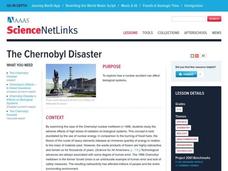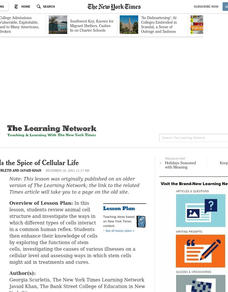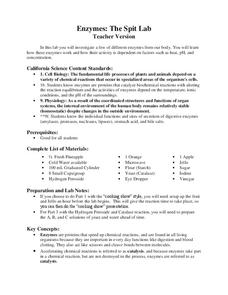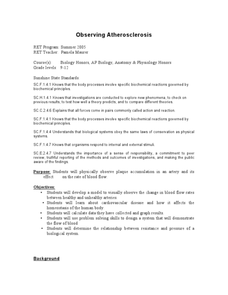Curated OER
All in the Family: Calculating Cousins
Students view pictures of distant "cousins" to humans. They place them in order by their distance from humans. Students receive a packet of six pages featuring graphics and a cousins summary page. They work in groups to complete 5 cousin...
Curated OER
THE CHERNOBYL DISASTER
Students explore how a nuclear accident can affect biological systems. They examine the case of the Chernobyl nuclear meltdown in 1986.
Curated OER
Small Intestine, Pancreas, Liver, and Gall Bladder
In this small intestine, pancreas, liver, and gall bladder activity, students fill in the blanks with information about these structures of digestion. Students research information about organ of the digestive system given.
Curated OER
Variety Is the Spice of Cellular Life
Do you need to review animal cell structure? Investigate the ways in which different types of cells interact in a common human reflex. Your students can explore the functions of stem cells, consider various illnesses and assess stem...
Curated OER
Termite Biology
Students explore the physical characteristics, distribution and habitat of termites. The lesson focuses on the termite as a social creature contrary to most other insects.
Curated OER
Living Environment 2006
In this chemistry worksheet, students answer 41 multiple choice question and 28 short answer questions to prepare for Living Environment Regents Exam.
Curated OER
Reproduction and Development
In this human reproduction worksheet, students will review the male and female anatomy and the hormones involved in the development towards sexual maturity. Students will also review the events that occur during the three phases of the...
LABScI
Vision Lab: The Eye
Our bodies have some amazing capabilities, but there are some limitations. Explore the limitations of the human eye through the eighth lab activity in a series of 12 biology lessons. Individuals measure their own peripheral vision and...
LABScI
Enzymes: The Spit Lab
Enzymes in our bodies each have a job to do. Learn the factors that affect the activity of some enzymes using the third activity of an informative 12-part biology series. A three-part laboratory activity asks teams to investigate how...
Curated OER
How We Learn About the Brain: Teaching the Infant Brain
Young scholars describe the development of an infant from conception to birth. In this biology lesson, students discover how a child's brain develop. They explain how children acquire motor and cognitive skills.
Curated OER
Enzymes
Tenth graders test their saliva for enzyme activity. In this enzyme lesson, 10th graders conduct an experiment to test the enzymatic activity of their saliva. They relate the lack of certain digestive enzymes with alcoholism.
Curated OER
What Do We Have In Common?
Seventh graders perform a dissection on a mussels and label their internal organs. In groups, they compare and contrast the mussels structure to those of human beings. They also review the functions that are necessary for survival and...
Curated OER
Energy Content Of Foods And Fuels
Students engage in a study of food and how it used as fuel for the human body. They research how biological systems require energy and compare them to the physical science systems like machines. They compare and contrast what they have...
Curated OER
Muscles in Motion
Middle schoolers explain how biceps and triceps work. In this life science lesson, students conduct an experiment to test which muscle (biceps or triceps) is stronger. They calculate class average from the result.
Curated OER
Coordination
Multiple choice, fill-in-the-blank, short answer, and matching questions are all here in a multi-page worksheet or quiz. While the formatting leaves a little to be desired, it would take just a few minutes to change the handout into a...
Curated OER
Standard 4 Review Sheet-Key Ideas Biology-The Living Environment
In this living environment worksheet, students answer a variety of questions about living organisms, the processes they go through to make food and break down food, absorb nutrients, and release toxins. They explain homeostasis, they...
Curated OER
Breathing
When learning about the respiratory system, how do learners know what is important? One way is to use a self-assessment or study like the one found here. While the formatting could use some work, the concepts are solid. Depending on your...
Curated OER
Reproduction, Day 1
Students identify the parts of the human body involved in reproduction. They examine the process of fertilization and discover all species reproduce. They practice using new vocabulary as well.
Teach Engineering
Biomimicry and Sustainable Design - Nature is an Engineering Marvel
Discover how copying nature can be beneficial to humans. Scholars read articles about examples of biomimicry and its potential applications. Along the way, they learn about Nature's Nine Laws and how they relate to biomimicry. This is...
Curated OER
Observing Atherosclerosis
Students develop a model to visually observe the change in blood flow rates between healthy and unhealthy arteries. They calculate data that they have collected and graph their results. They determine the relationships the flow of...
Curated OER
Totally Cellular
In this biology instructional activity, students learn about cells and their various parts. They first read a page and a half of facts about cells and then answer the 10 questions in the packet. The answers are on the last page.
Curated OER
One + One = One
Students develop problem solving skills while developing writing skills. They assume responsibility for a sugar or egg "baby" and journal the experiences. In addition, they create a birth certificate and a holder.
Curated OER
Bones: The Body's Support
In this bones activity, students compare the axial and the appendicular skeletons. Students also review the bone components. This activity has 6 matching, 8 short answer, 4 fill in the blank, and 6 true or false questions.
Curated OER
The Effects of Alcohol and other Teratogens: A model using Zebrafish
Young scholars investigate the interference of various drugs on an embryo through experimentation. This is an open-ended lab to allow students to see effects of various chemicals humans choose to put in their bodies and create...

























